Mothers and children must be prioritised so they can care for their children. IBFAN has been exposing the risks of commercial exploitation of emergencies since the early 1980s and we are a founder and active member of the multi-agency Infant feeding in Emergencies Core Group (IFE), set up in 1999, to ensure coordinated infant and young child feeding policies and support in emergencies. These six IFE message have been produced to help ensure correct messaging about breastfeeding and malnutrition. Please share them widely to help save lives:
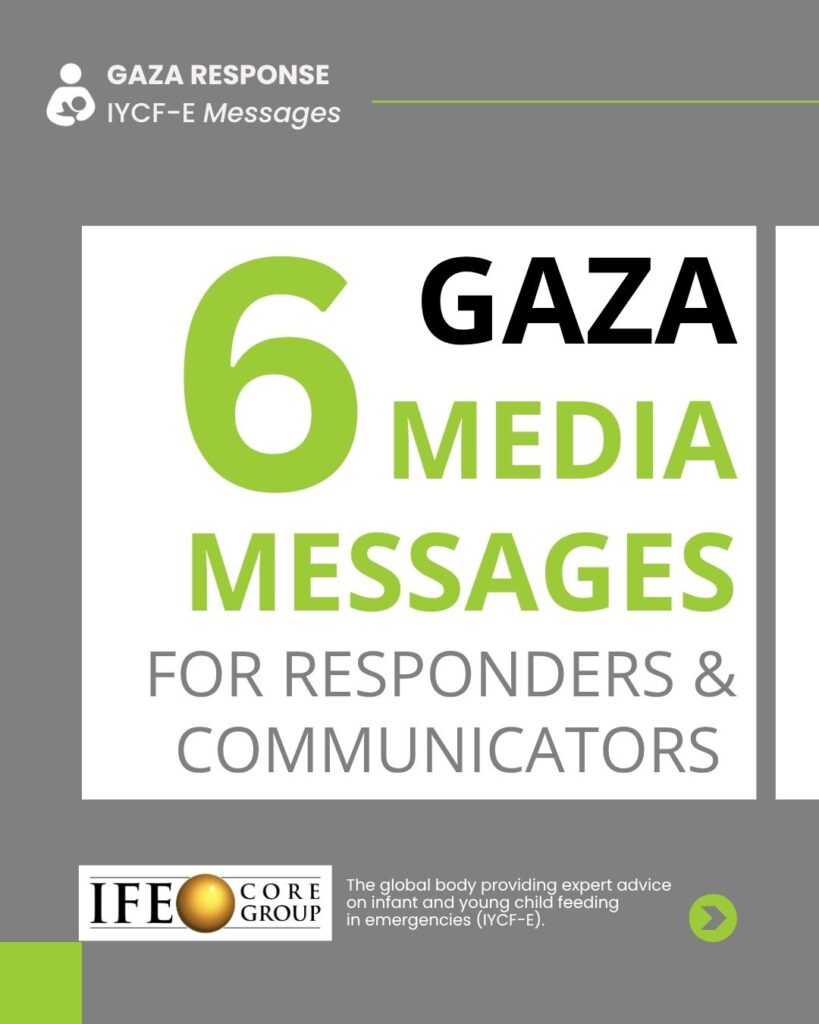
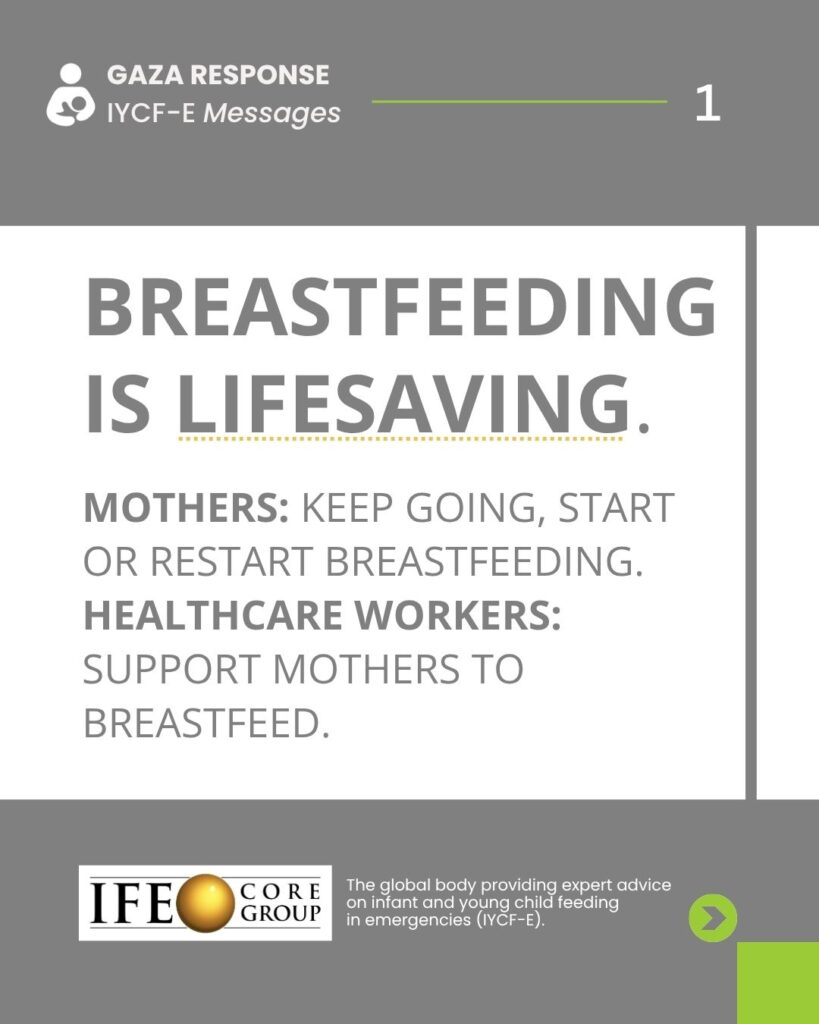
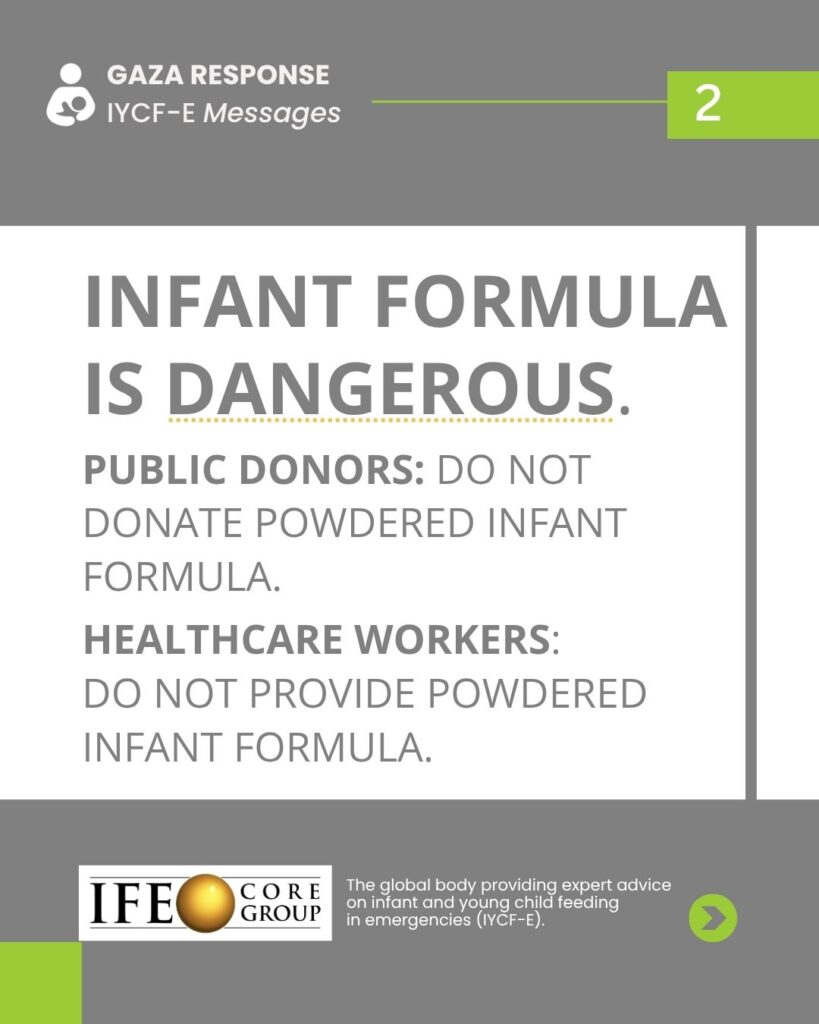
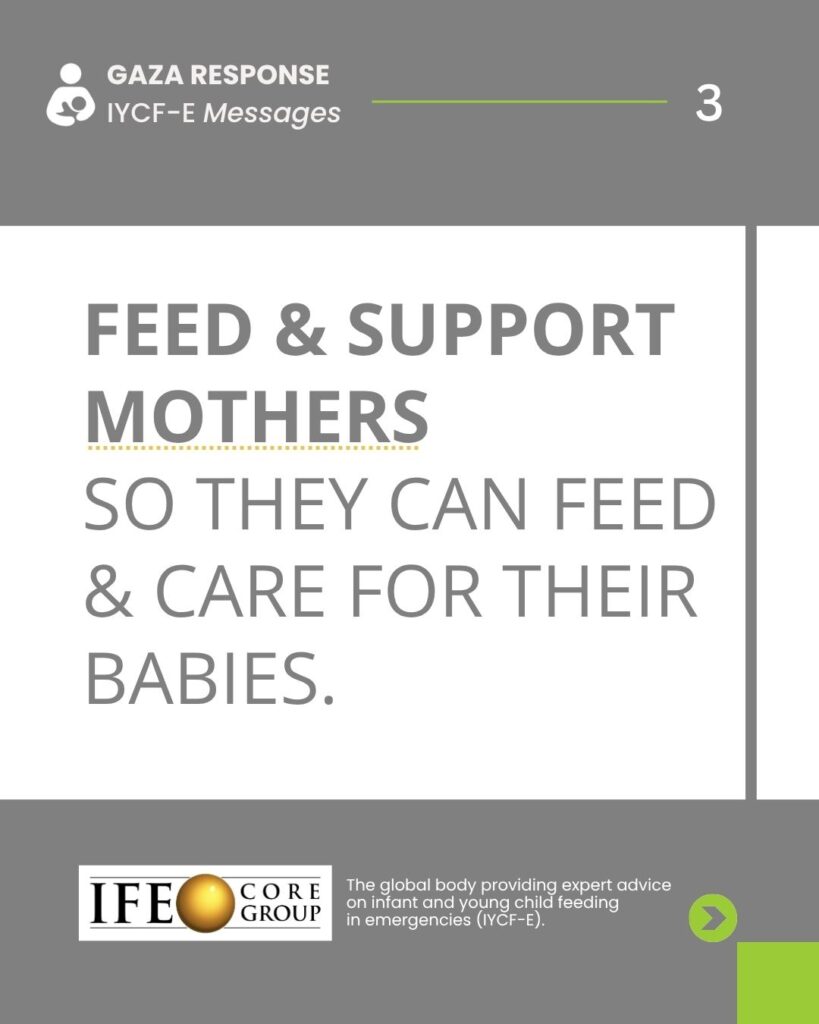
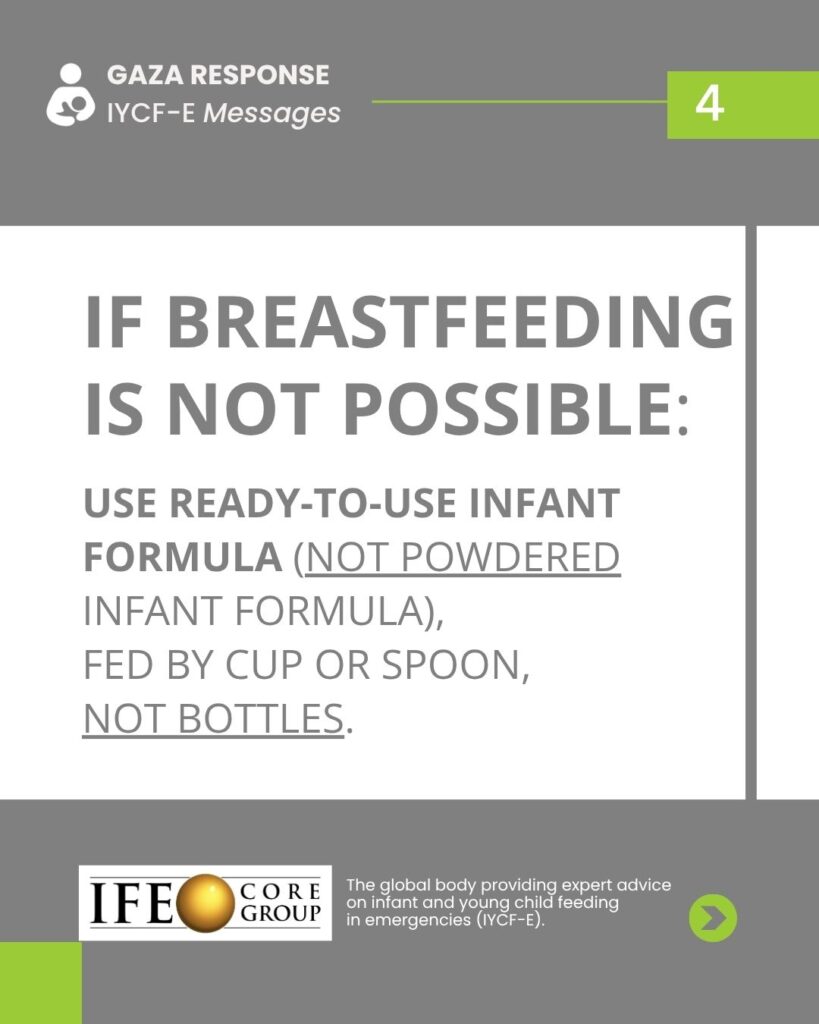
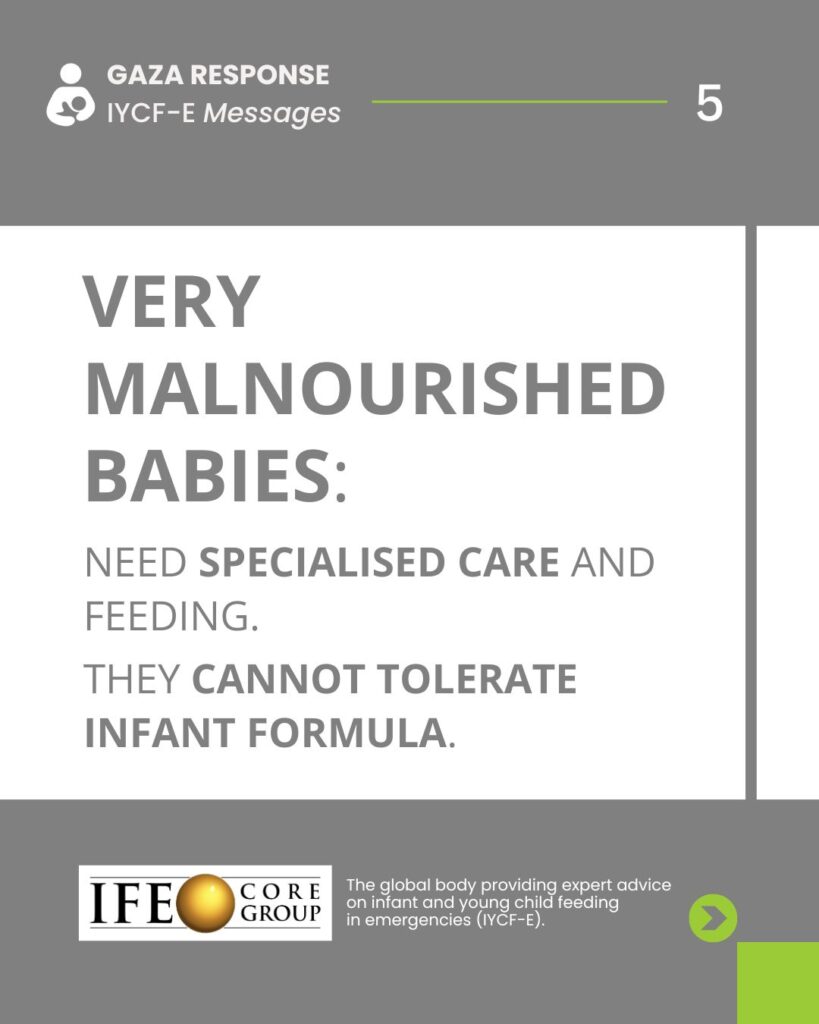
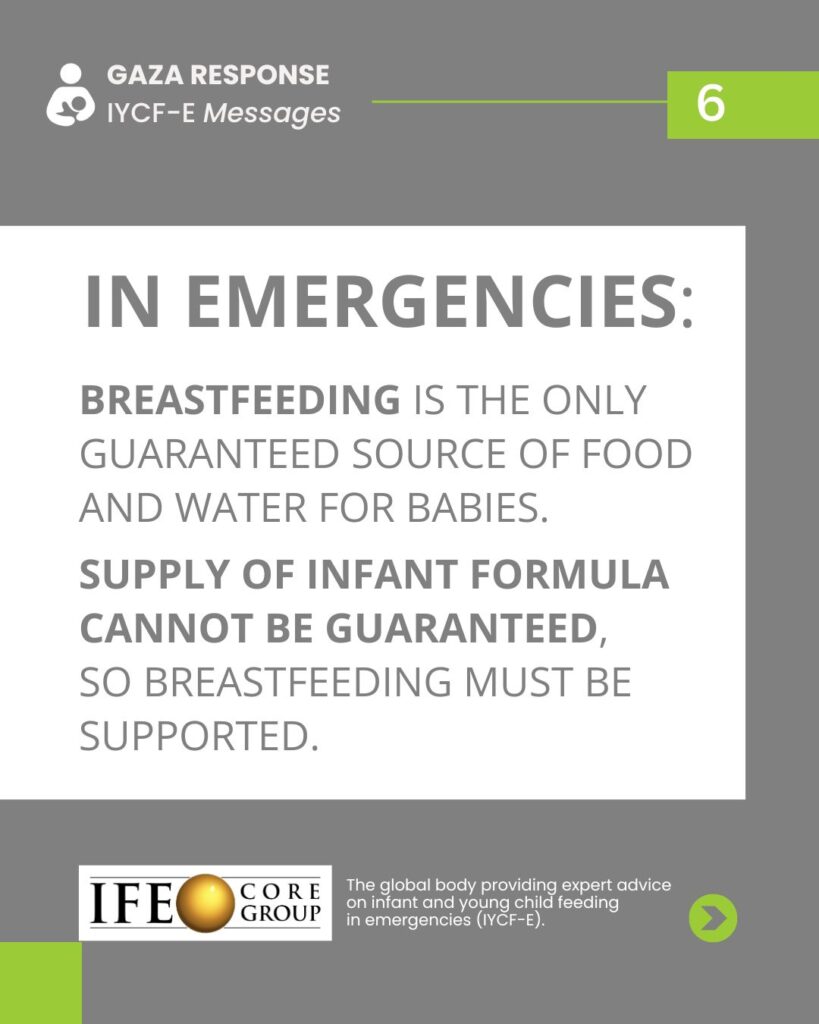
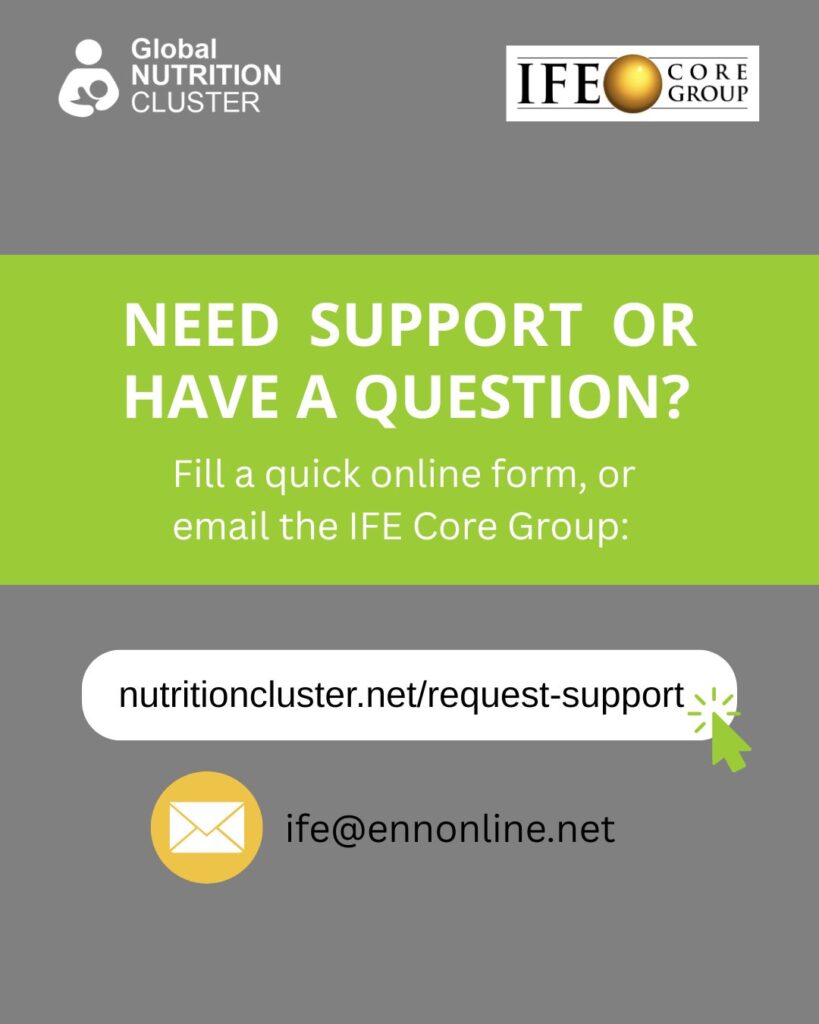
- Situation analysis in Gaza
- Like and share the post on Linkedin and on Facebook.
- Find the resource as a PDF under “Latest News and Key Resources” on GNC’s Gaza crisis dedicated page.
- Hashtag: #GazaCrisis #InfantFeeding #Gaza
- DOWNLOAD: PDF OR CARDS
These messages are essential for:
- Nutrition and health practitioners
- Public donors and fundraisers
- Media and the general public
- Humanitarian responders
- Mothers and caregivers
- Emergency planners
𝗖𝗼𝗻𝘁𝗮𝗰𝘁 𝘁𝗵𝗲 𝗜𝗙𝗘 𝗖𝗼𝗿𝗲 𝗚𝗿𝗼𝘂𝗽: http://bit.ly/452PtvL
Ask questions via the 𝗜𝗬𝗖𝗙-𝗘 𝗳𝗼𝗿𝘂𝗺: http://bit.ly/3IZqKA2
“Sudan’s women and children are paying the highest price for a war the world barely acknowledges. 12 million people have been displaced by conflict and more than half are children—many are malnourished, separated from their families, or traumatised. Pregnant women are forced to give birth without skilled attendants, sterile equipment, or access to emergency obstetric care. Gender-based violence is surging: reports from Amnesty International and UNICEF document the systematic use of rape as a weapon of war, including against girls aged as young as 1 year. Survivors face deep stigma and almost no access to mental health support. The impacts of war on women and children are well known. The Lancet’s BRANCH Series showed that in conflict settings, maternal, newborn, and child health services are among the first to collapse and the last to be restored. In Sudan, this collapse is accelerating, with a devastating long-term toll.”
This article from The Lancet discusses the overlooked health crisis in Sudan. Read the full text here.
The Lancet. Sudan: a health catastrophe ignored. Lancet. 2025 Aug 2; doi:10.1016/S0140-6736(25)01563-6
IBFAN has been exposing the risks of commercial exploitation of emergencies since the early 1980s. We are a founder and active member of the multi-agency Infant feeding in Emergencies Core Group, that was set up in 1999 to ensure coordinated infant and young child feeding policies and support in emergencies.
UNICEF – Updated 14 Jul 2025

The focus of this guidance on wet nursing is as a compassionate, altruistic, and unpaid arrangement between a caregiver and a woman willing to breastfeed the infant. Our goal is to facilitate access to breastfeeding for vulnerable infants by normalizing support for wet nursing as part of infant and young child feeding strategies in emergencies.
The guidance includes:
- Technical and practical advice on why, where, when, and how to support wet nursing within health and nutrition in emergency settings
- Recommendations that primarily target emergency response but are also applicable in non-emergency settings to enhance resilience and preparedness.
- Recognizing that there are diverse reasons for wet nursing, this guidance presents scenarios commonly faced in emergencies, where wet nursing can be urgent and essential for child survival as a package of services for mothers and infants.
READ MORE (DOWNLOAD)
Frontiers in Nutrition: Frontiers’ Research Topics are collaborative hubs built around an emerging theme.Defined, managed, and led by renowned researchers, they bring communities together around a shared area of interest to stimulate collaboration and innovation.
Infant feeding during emergencies is a critical area of research, particularly given the heightened risks of undernutrition and increased child mortality rates in such contexts. Infants and young children are among the most vulnerable populations during crises, where interrupted breastfeeding and inappropriate complementary feeding can lead to severe health consequences. Environmental factors such as water, hygiene, and sanitation (WASH), food insecurity, and psychological trauma further exacerbate these risks. Despite the well-documented benefits of breastfeeding, including reduced morbidity, improved cognitive outcomes, and economic advantages, emergencies often disrupt breastfeeding practices. Global health recommendations have emphasized the importance of alternative feeding methods, such as wet nursing, donor human milk, milk banking, and re-lactation, especially in high-risk scenarios. However, the implementation of these alternatives remains inconsistent, highlighting a significant gap in emergency preparedness and response.
Infant feeding during emergencies is a critical area of research, particularly given the heightened risks of undernutrition and increased child mortality rates in such contexts. Infants and young children are among the most vulnerable populations during crises, where interrupted breastfeeding and inappropriate complementary feeding can lead to severe health consequences. Environmental factors such as water, hygiene, and sanitation (WASH), food insecurity, and psychological trauma further exacerbate these risks. Despite the well-documented benefits of breastfeeding, including reduced morbidity, improved cognitive outcomes, and economic advantages, emergencies often disrupt breastfeeding practices. Global health recommendations have emphasized the importance of alternative feeding methods, such as wet nursing, donor human milk, milk banking, and re-lactation, especially in high-risk scenarios. However, the implementation of these alternatives remains inconsistent, highlighting a significant gap in emergency preparedness and response.
This research topic aims to compile state-of-the-art research that illustrates experiences and interventions in humanitarian, fragile, or development contexts to support non-breastfed infants. The goal is to explore how the recommendations of the Infant and Young Child Feeding in Emergencies (IYCF-E) Operational Guidance and the Sphere Standards are being implemented. By focusing on safer alternatives to maternal breastfeeding, this research seeks to answer critical questions about the effectiveness of these interventions, the challenges faced, and the lessons learned. The objective is to provide a comprehensive understanding of how to best support infants who cannot be breastfed by their biological mothers during emergencies.
To gather further insights into the range and limitations of this research topic, we welcome articles addressing, but not limited to, the following themes:
• Wet nursing in humanitarian, fragile, and development contexts: experiences, lessons learned, and recommendations
• Re-lactation in humanitarian, fragile, and development contexts: experiences, lessons learned, and recommendations
• Human donor milk in humanitarian, fragile, and development contexts: experiences, lessons learned, and recommendations
• Human milk banks for newborns and non-breastfed infants during disasters and emergencies
• The last resort: infant formula feeding for formula-dependent infants in emergency and fragile environments—how it worked, what was learned, and recommendations
These articles collectively strengthen the evidence base and provide actionable lessons that align with and reinforce the IYCF-E Operational Targets They underscore the responsibility of governments, humanitarian actors, and technical working groups — including our IFE Core Group — to ensure that infants who cannot be breastfed are supported with safe, appropriate, and sustainable feeding options, even under the most challenging conditions.
With information from Baby Milk Action
Six lifesaving messages for Gaza and similar settings
The lack of food, and medical supplies that mothers and families of Gaza face is…
IBFAN Statement on Gaza
After more than four decades working to prevent child illness, suffering and death, IBFAN is…



